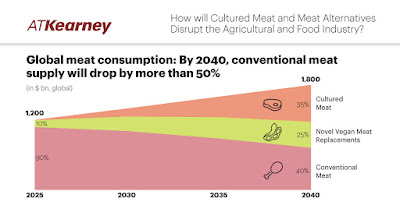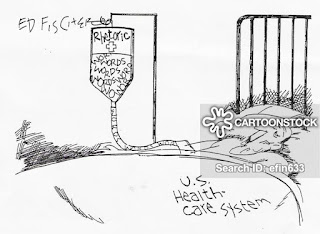All that may change within a generation. Consulting firm A.T. Kearney, for example, predicts that by 2040 60% of the "meat" most of the world eats will come from meat substitutes.
Whether this will be good for our health remains to be seen.
 |
| Credit: NTL Photography |
Still, Beyond Meats is not satisfied. CEO Ethan Brown told The Verge: "We are on this mission to build a perfect piece of meat and that product is imperfect. There are things about it that aren’t exactly like meat and that really bothers us."
Meanwhile, fast food chains are having a hard time keeping Impossible Food's meat alternatives in stock. Their Impossible Burger is on the menu at 9,000 restaurants -- when you can get it. "We are working our hardest to increase production and are making real strides," a spokesperson told CNET. It's a good problem to have; CNET also reports the company has seen a 50% increase in revenue since Impossible Burger 2.0 launched in January 2019.
 |
| Tyson Foods' new nuggets |
Are we just an animal protein company, or a protein company? Once you expand that definition, where does it allow you to go?"His conclusion: "There are opportunities for us to produce and supply many of the products produced today in traditional form, in plant-based form."
Plant-based meat alternatives have been around for many years, particularly soybean-based, but failed to generate much excitement from anyone who was not already a vegetarian/vegan. Firms like Beyond Meats and Impossible Foods have taken these products to new levels, reaching more mainstream audiences. And we may just be scratching the surface.
The next wave may be cell-cultured meat, for which regulators are just starting to get a framework. In this version, cells harvested from an animal are actually cultured in a lab to product the final product. All the taste, texture, and appearance of "traditional" meat, but without any animals actually being slaughtered, and potentially cheaper. "If only half of it becomes remotely true, it will be one of the most important advancements of the century," Kristopher Gasteratos of the Cellular Agricultural Society told The Washington Post.
In its report, A.T. Kearney forecast that cultured meats will be the majority of alternative meats by 2040.
This is not much ado about nothing. It is not just another food craze. Americans eat about 200 pounds of meat per year, split about equally between livestock and poultry. Most people have heard warnings that too much red meat is not good for us (and white meat may not be all that much better), but most of us don't think about the impact of the meat industry on the environment.
All those cows, pigs, chickens, and turkeys take a lot of effort: crops to feed them, space to raise them, and a godawful about of waste (including plenty of methane). As Timothy Egan wrote in The New York Times: "Industrial agriculture to produce meat is the coal-mining of food production."
Not a pretty picture.
There economics of supplying all that meat, especially as people in developing nations start wanting more, are going to force us to meat alternatives. When we get serious about climate change -- and someday soon we're going to have to -- reducing the impact of the meat industry is going to be high on the list of targets. It is going to happen. It will get cheaper, it will fool our taste buds, and younger generations will never even know they've made a trade-off.
That doesn't necessarily mean it is going to be good for us. We're eating a lot more processed food than we were even a generation ago, and it clearly has not been good for us. Just look at obesity and diabetes rates, among other measures. We know how to make food cheap, and how to make it tasty, but we're not as good at making cheap, tasty food healthy.
As Mr. Egan also said:
The cautionary note is that we don’t have enough experience yet with the “secret sauce” that makes the new line of fake burgers taste so good. Both Beyond Meat, and Impossible Foods, the two darlings of alt-meat, use about 20 different ingredients in their patties. They are highly processed Frankenfoods hatched in a lab, not carrots pulled out of the earth.And those are plant-based alternatives, not cultured meats that most would more likely think of as "Frankenfoods." We may be substituting one kind of processed food for another.
My worry is that we're not evolved to eat these meat alternatives. We evolved to eat meat and plants. We evolved a complex microbiota to go along with them. But we've barely scratching the surface of understanding our microbiota and its impact on our health.
 |
| Stanford study on alternative meat & gut microbiome |
Synthetic meat is going to happen. For that matter, synthetic plants are probably going to happen. The "coal mining" metaphor illustrates why. I just hope we design them as much for our health as we do for our taste.












